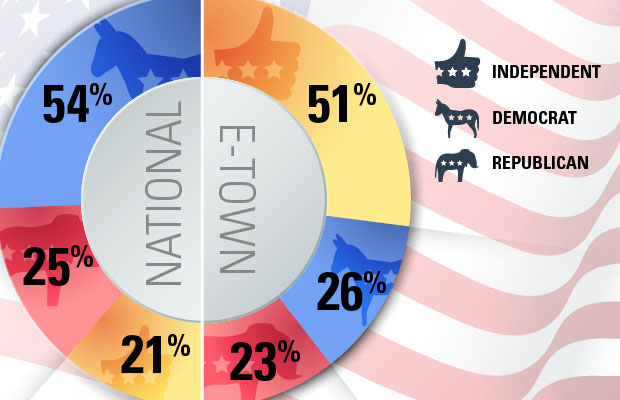“We know from research in political psychology that exposure to different viewpoints increases political tolerance. We see evidence of that at Elizabethtown College.” ~ April Kelly-Woessner, professor of political science and department chair at Elizabethtown College.
Every spring, April Kelly-Woessner’s political science students design a survey to measure the campus political climate. Although the survey varies slightly from year to year, depending on the students’ research questions, the responses consistently reveal that E-town Boasts more political diversity than the average college.
“E-town students are committed to a robust exchange of ideas,” Kelly-Woessner said, pointing out that it’s the only college to her knowledge that includes a commitment to political tolerance in its pledge of integrity. The pledge requires students to “respect the free exchange of ideas both inside and outside the classroom.”
Though U.S. college students tend to skew heavily liberal, according to a 2016 Penetta Institute report—54 percent identified as Democrats, 25 percent as Republican—and a 2012 Harvard Political Review article—60 percent supported Obama; 36 percent backed Romney—the party division chasm is significantly less prominent at Elizabethtown.
E-town students are committed to a robust exchange of ideas.”
In the E-town student survey, independents topped the 688 participants at 51 percent; 23 percent saw themselves as Republican; and 26 percent identified as Democrat. Among the 51 percent self-identifying as Independent, 199 leaned toward Democrat and 98 toward Republican.
Even within the parties, the division was soft. Of the 258 students who saw themselves as Republican or Independent-leaning Republicans, only 20 declared themselves as strong Republicans. Likewise with Democrats or Independent-leaning Democrats. Of the 314, only 57 identified themselves as strongly Democrat.
In the 2015 E-town survey the students were almost an exact split. Democrats tallied in at 33 percent; Republicans counted at 32 percent.
Considering that the largest percentage gap in political division among college students takes place in the American Northeast, with 70 percent of all participating students reporting they would vote Democratic in congressional elections, E-town is considerably more balanced than the average U.S. college and far more equalized than those in the Northeast.
Even with faculty, E-town bucks the system. On a national level, college faculties are heavily slanted toward the Democratic Party with a 12 to 1 ratio. At E-town, however that ratio drops, significantly, to 2.5 to 1, and that’s not counting those who identify with Libertarian or other parties.
This diversity of political viewpoints at E-town is reflected in the College’s campus political clubs, Kelly-Woessner said. There are three active political groups: College Republicans, College Democrats and Young Americans for Liberty.
“At a small campus like E-town, we don’t find the same level of political polarization we see in the outside world,” said Kelly-Woessner. “Because our students know each other so well, it’s difficult for them to isolate themselves into politically homogeneous groups and demonize the opposition. … While our College Democrats and College Republicans disagree on many issues, they both defend the others’ right to free speech.”
Theoretically, she said, this diversity of perspectives should encourage a high level of political tolerance. In fact, 91 percent of students in the College’s 2015 survey said they have never been treated unfairly because of their political views.
E-town Democrats and Republicans, she said, work together on campus in a way that should be a model for our elected officials.


